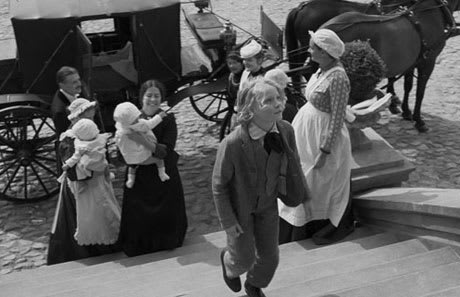The winner of the Palme D'or at the 2009 Cannes Film Festival, Michael Haneke's latest indictment of humanity takes aim at the German sensibility, pre-WWI, implying that malice, deception and blind vengeance lie beneath a polite and orderly exterior.
Filmed impeccably in black and white, to reinforce the dominant ideology, this two-and-a-half-hour human examination builds its sense of unease similarly to 2004's Cache, with flawless dexterity and a superior technical package. Fans of thinking cinema need look no further than this, a great cinematic achievement.
In 1913 Eichwald, a small German village, a doctor (Rainder Bock) is deliberately injured while horseback riding, a cabbage patch is destroyed and a child is tortured. Other similar events compound, leaving the townsfolk concerned but mostly closed-lipped, save Lehrer (Christian Friedel), a young schoolteacher troubled by the happenings, who's also courting 17-year-old Eva (Leonie Benesch).
The stories intersect with a stern pastor and authoritarian Baron wielding their influence over both the village and families, with a smidgeon of adultery and child abuse thrown in for good measure. The consistency is that of repression, as children are scolded for any sign of youthful glee, forced to quietly behave and digest whatever explanations are handed to them. Hypocritically, as the title implies, some children are forced to wear a white ribbon to remind them of innocence and purity, qualities their elders repeatedly squash.
Here, the central mystery of mischievous events proves secondary to an overall village dynamic meant to shed light on wartime atrocities, as outlined in the opening voiceover. Punishment comes before reason or exception, even if it means further unnecessary suffering for the innocent. While the implication is that of German will, these characteristics are evident in the majority of the populous, taking The White Ribbon beyond its preliminary pedagogy, smartly recognizing implicit human foibles.
While severe in message and medicinal in application, a major strength in Haneke's latest offering is just how straightforward and engrossing it manages to be, regardless of its overt subtext. These many virtues, mixed with some fantastically vicious dialogue later in the film, make this one a film that needs to be checked out.
(Mongrel Media)Filmed impeccably in black and white, to reinforce the dominant ideology, this two-and-a-half-hour human examination builds its sense of unease similarly to 2004's Cache, with flawless dexterity and a superior technical package. Fans of thinking cinema need look no further than this, a great cinematic achievement.
In 1913 Eichwald, a small German village, a doctor (Rainder Bock) is deliberately injured while horseback riding, a cabbage patch is destroyed and a child is tortured. Other similar events compound, leaving the townsfolk concerned but mostly closed-lipped, save Lehrer (Christian Friedel), a young schoolteacher troubled by the happenings, who's also courting 17-year-old Eva (Leonie Benesch).
The stories intersect with a stern pastor and authoritarian Baron wielding their influence over both the village and families, with a smidgeon of adultery and child abuse thrown in for good measure. The consistency is that of repression, as children are scolded for any sign of youthful glee, forced to quietly behave and digest whatever explanations are handed to them. Hypocritically, as the title implies, some children are forced to wear a white ribbon to remind them of innocence and purity, qualities their elders repeatedly squash.
Here, the central mystery of mischievous events proves secondary to an overall village dynamic meant to shed light on wartime atrocities, as outlined in the opening voiceover. Punishment comes before reason or exception, even if it means further unnecessary suffering for the innocent. While the implication is that of German will, these characteristics are evident in the majority of the populous, taking The White Ribbon beyond its preliminary pedagogy, smartly recognizing implicit human foibles.
While severe in message and medicinal in application, a major strength in Haneke's latest offering is just how straightforward and engrossing it manages to be, regardless of its overt subtext. These many virtues, mixed with some fantastically vicious dialogue later in the film, make this one a film that needs to be checked out.
